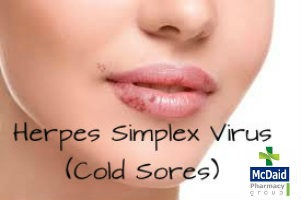Herpes simplex, also known as HSV can be divided into two main types:
- HSV 1 – Also known as oral herpes that can cause cold sores and fever blisters around the mouth and on the face.
- HSV 2 – This type is generally responsible for genital herpes outbreaks.
A cold sore usually begins with a tingling, itchy or burning sensation. Small fluid filled blisters appear usually on the lips, but sometimes anywhere on the faces. The blisters burst and crust over into a scab. The whole process usually takes about 10-20 days, but the sores may spread.
Most people are exposed to the virus when they are young after coming into contact with someone who has a cold sore.
![]()
Certain triggers may cause cold sores:
- Stress
- Fatigue
- Cold weather
- Excessive sunlight
- Hormonal changes
- Dental trauma
- Weakened immune system
Once they disappear they never truly disappear because they lie dormant in nerve cells waiting to recur once triggered again.
Cold sores are very contagious, especially when the blisters burst, so avoid contact with anyone until they disappear. Kissing a baby for instance can cause neonatal herpes, which is very dangerous to newborn babies.
![]()
TREATMENT
Antiviral medications such as Acyclovir, Famciclovir and Valacyclovir are the most effective medications for people infected with HSV. These help reduce severity and frequency of symptoms but cannot cure the infection.
Simple treatments include antiviral creams to speed up the healing time e.g. Zovirax, Viralief, and Acic. Aloe Vera creams ease the pain and irritation, and cold sore patches protect the skin while it heals; and are also beneficial for cosmetic purposes.
Patients who present with regular cold sores should be advised that the amino acid lysine can be used to prevent cold sores. The use of sunscreen should also be advised. Aloe Vera gel and ice can be applied to stop the spread of sores. Aftershave and perfumes which contain small amounts of alcohol can help to speed up healing times as alcohol has antiviral properties.
HSV1 is mainly transmitted via oral to oral contact to cause oral herpes but can also cause genital herpes.
HSV2 is a sexually transmitted infection that causes genital herpes.
Both HSV1 and HSV2 are lifelong infections. An estimated 3.7 billion people under the age of 50 (67%) have HSV1 infections globally. An estimated 4.7 million aged 15-49 (11%) worldwide have HSV2.
An infection with HSV2 increases the risk of acquiring and transmitting HIV infection.


